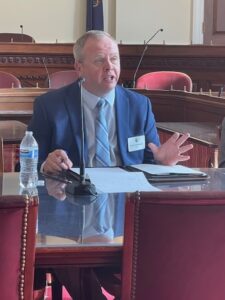The Rocky Mountain Elk Foundation took one of its highest national legislative priorities directly to the source of the federal decision-making process – Capitol Hill in Washington, D.C. RMEF accepted an invitation to appear at a policy briefing to address challenges faced by federal forestland and the impacts on elk and other wildlife.
RMEF is an invested stakeholder when it comes to America’s federal public lands. It has decades of experience working with the U.S. Forest Service and Bureau of Land Management. To date, RMEF and the two federal agencies combined to complete more than 5,100 conservation and hunting heritage projects that conserved or enhanced more than 6.4 million acres of habitat and opened or improved public access to more than 765,000 acres.
 “Despite the thousands of habitat projects that RMEF, the forest service and many other NGOs have engaged in in recent decades, those efforts are dwarfed by policy decisions made here in Washington and in courtrooms around the country,” said Ryan Bronson, RMEF director of government affairs (see photo on left). “Misguided choices have led to diminished habitat quality, overgrown forests and increasing catastrophic wildfires.”
“Despite the thousands of habitat projects that RMEF, the forest service and many other NGOs have engaged in in recent decades, those efforts are dwarfed by policy decisions made here in Washington and in courtrooms around the country,” said Ryan Bronson, RMEF director of government affairs (see photo on left). “Misguided choices have led to diminished habitat quality, overgrown forests and increasing catastrophic wildfires.”
As of early June, more than 29,000 wildfires burned upwards of 1,241,000 acres of land across the United States in 2025, with summer’s hottest months still to come. High intensity fires not only endanger human safety but destroy forests, wildlife forage and plant root systems, trigger erosion and ruin water quality in streams and rivers.
Wildfire risk aside, decades of fire suppression left much of the nation’s forestland with degraded wildlife habitat, excessive downfall and closed tree canopies that block sunlight from reaching and nourishing native vegetation below. Because of those issues, elk spend less time on federal land now than in the past.
“That is why the top federal policy priority of RMEF is the Fix Our Forest Act. The legislation has already passed the House on a strongly bipartisan 279-141 vote, and while the Senate version has some notable differences, the most important reform elements are found in both versions. RMEF is asking the Senate to mark up and pass the bill as soon as possible,” said Bronson.
A key provision in both bills is fixing the Cottonwood decision, a 2015 ruling that forces project managers to reconsult with the U.S. Fish and Wildlife Service over endangered species whenever new information was presented. That declaration created a never-ending litigation loop that delays or prevents much-needed active forest management work such as forest thinning, prescribed burns and noxious weed treatments.
Both the Obama and first Trump administrations tried but failed to reverse that ruling.
“The Fix Our Forests Act contains a direct and clean fix, and RMEF has been working to build bipartisan support for this critical policy correction,” said Bronson. “Issues of weather, disease and climate are largely outside of our control, but we have the ability to choose what to do when it comes to managing our forests for resiliency. We only need the political courage to choose to do so. Passing Fix Our Forests is the next critical step.”
The briefing took place at the Longworth House Office Building, one of several buildings used by the House of Representatives within the U.S. Capitol complex.
(Photo source: Rocky Mountain Elk Foundation)
